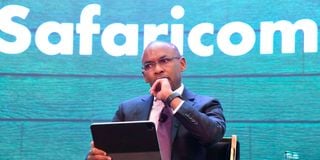Premium
Safaricom feels pinch of ceded tariff revenues

Safaricom PLC CEO Peter Ndegwa during the telco's half-year results at the Michael Joseph Center on November 11, 2022.
Safaricom's net profit for the six months ended September fell by 10 per cent to Sh33.5 billion on the impact of a cut on the mobile termination rate (MTR) and higher costs associated with the entry into Ethiopia.
MTRs are the charges levied by a mobile service provider on other telcos for terminating calls on its network.
Safaricom, Airtel, Telkom, and Jamii Telecommunications in August reached a middle ground before the Communications and Multimedia Appeals to cut and Fixed Termination Rate (FTR) from Sh0.99 to Sh0.58.
The new rate will be effective for an interim one-year period before the CA announces a substantive rate.
Safaricom’s total revenue rose by 4.6 per cent to Sh153.4 billion in the half-year to September, helped by an 8.7 per cent increase in M- Pesa revenue to Sh56.9 billion, and an 11.3 per cent jump in data earnings to Sh26.3 billion.
Voice revenue fell by 3.8 per cent to Sh39.9 billion, while total costs rose by a third to Sh31 billion, largely on the back of the firm's investment in its new Ethiopia subsidiary.
“Voice is the most important portfolio that we have, when a new customer comes that is where they start their service with. We need to make sure that everything we do is on top of that,” Safaricom chief finance officer, Dilip Pal said yesterday in Nairobi during the announcement of the results.
Safaricom heavily blamed the reviewed MTR for the dip in fortunes, lamenting that the telco stands to lose up to Sh3 billion by March- when the financial year ends. The company said the cut in MTR punched a Sh500 million hole in the company's revenue in the two months that the new interim rate has been in place.
“We’ve only had a two months’ impact on MTR because the new rate was introduced in August. If you annualise that, it will be Sh3 billion impact on our business. It has a substantial impact on our business,” Safaricom chief executive officer Peter Ndegwa said during the event.
The reviewed MTR benefited Safaricom’s main rivals Airtel and Telkom. The giant telco’s rivals stand to save Sh1.4 billion and Sh190.5 million in MTR and FTR costs on average, during the year. The operators have been bickering over the Sh0.99 MTR and FTR rate for years, with rivals accusing Safaricom of making money from a service that ought to only recover its costs.
Airtel, Telkom, and Jamii telecommunications argued for lowering the rates, stating that the move would make voice services cheaper and more accessible to Kenyans.
The Ministry of Information and Communication Technology (ICT) had also pressured Safaricom ahead of the MTR review, accusing the telco of pushing for a system that punishes its competitors and making more than seven times its rightful share in MTR and FTR rates.
The company also attributed the downward performance to heavy investments it has undertaken during its entry to Ethiopia, even as it stated it would take about four years for the Ethiopian investment to break even.





